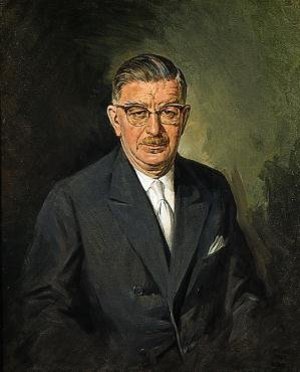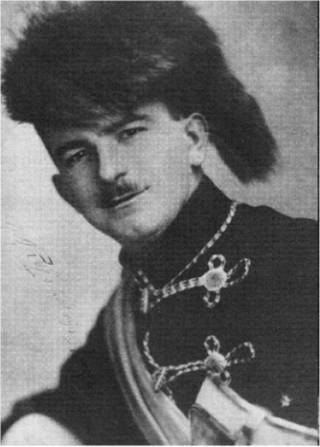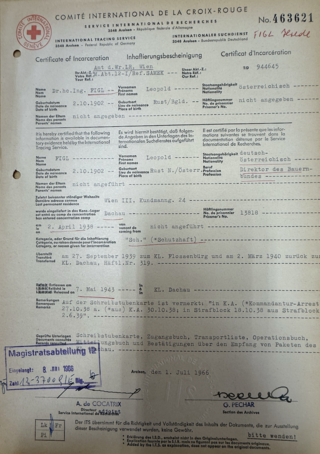Dipl.-Ing. Dr. h. c. Leopold Figl

Personalia
Born:
Died:
Profession:
Persecution:
Protective custody 12.03.1938 - 01.04.1938,
Dachau concentration camp 02.04.1938 - 27.09.1939,
Flossenbürg concentration camp 27.09.1939 - 02.03.1940,
Dachau concentration camp 02.03.1940 - 07.05.1943,
Mauthausen concentration camp 08.10.1944 - 21.01.1945,
Imprisonment 21.01.1945 - 06.04.1945
KZ Number:
Memberships
Curriculum Vitae
The son of a farmer from Tullnerfeld, Leopold Figl attended grammar school in St. Pölten from 1916, where he founded the secondary school fraternity Nibelungia St. Pölten
In 1923, Leopold Figl joined the student association Norica. In May 1927 - while still a student - he was appointed secretary of the Lower Austrian Farmers' Association, becoming deputy director in 1931 and director in December 1933. After completing his studies, he worked at the Bauernbund headquarters and was appointed director of the Reichsbauernbund in 1937. He was also a member of the Federal Economic Council and the Reich Farmers' Council. In addition, he held various positions in the VF.
He publicly spoke out against National Socialism. He uncompromisingly rejected the Nazi ideology out of the deepest conviction because he recognized the dangers posed by this new system early on. He was one of the first to be arrested in his apartment in Vienna on March 12, 1938 after the Anschluss and transferred to the police prison. On April 1, 1938, he was transferred to the Dachau concentration camp [Gestapo list no. 143] on the first transport, the so-called "Prominent Transport", where he was housed in Block 13, the Austrian Block.
Leopold Figl was the first Austrian to be sentenced to a beating because he had spoken illicitly about Austria. He was placed over a trestle in front of the assembled prisoners and guards by two burly SS men and beaten 25 times on the back with a water-soaked bullwhip in slow motion to delay the cruel procedure. He has to count along as long as he can. When he is untied again, he lies unconscious on the trestle, his back covered in blood and bruised. He is then given six months in a dark cell. In a windowless cell with a cot, he is given bread and water twice a week.

He was then deployed in the construction office of the concentration camp. In September 1939, he was transferred to Flossenbürg concentration camp. In April 1940, Leopold Figl was transferred back to Dachau concentration camp and fell ill with typhus. After more than five years in the concentration camp, he is provisionally released on May 8, 1943. His confederate brother Julius Raab finds him a job at the Lenikus road construction company. Despite the persecution and torment he suffered in the concentration camps, he went underground and tried to reactivate the Farmers' Union in Lower Austria.
At a conspiratorial meeting on May 4, 1944 in the wine cellar of Josef Reither in Judenau (district of Tulln), both the reactivation of the Farmers' Union and the founding of a new People's Party [later the ÖVP] were discussed. Finally, secret Saturday meetings are held in Figl's apartment in Vienna. After the assassination attempt on Hitler on July 20, 1944, Josef Reither was also arrested on July 22, 1944. When the meeting of May 4, 1944 was discovered, Leopold Figl was arrested again on October 8, 1944 and taken to Mauthausen concentration camp. On January 21, 1945, he was transferred to Vienna together with Lois Weinberger, Heinrich Maier and Felix Hurdes for trial at the Regional Court. Here they are tried before the People's Court and sentenced to death for high treason. Only the collapse of Nazi rule saved Leopold Figl from execution. Due to the advance of the Red Army, he is released together with other death row prisoners on April 6, 1945.
On April 17, 1945, Figl is one of the co-founders of the Austrian People's Party [ÖVP] and its federal chairman in Vienna's Schottenstift. He was elected Federal Chancellor from 1945-1953 and was subsequently Foreign Minister from 1953-1959. In this function, he was able to sign the State Treaty in 1955, which gave Austria back its sovereignty. From 1959-1962, he became First President of the National Council and from 1962 until his death, he once again held the office of Governor of Lower Austria.
Leopold Figl was a lifelong student of the Couleur with heart and soul. This is also evidenced by the large number of fraternities that have awarded him their ribbon. Streets and squares have been named after him in numerous towns and cities, not only in Lower Austria. On October 2, 2012, a memorial sculpture was unveiled at the former Mauthausen concentration camp.
A conspiratorial meeting on May 4, 1944 in the wine cellar of Josef Reither in Judenau (district of Tulln) discussed both the reactivation of the Farmers' Union and the founding of a new People's Party [later the ÖVP]. Finally, secret Saturday meetings are held in Figl's apartment in Vienna. After the assassination attempt on Hitler on July 20, 1944, Josef Reither was also arrested on July 22, 1944. When the meeting of May 4, 1944 was discovered, Leopold Figl was arrested again on October 8, 1944 and taken to Mauthausen concentration camp. On January 21, 1945, he was transferred to Vienna together with Lois Weinberger, Heinrich Maier and Felix Hurdes for trial at the Regional Court. Here they are tried before the People's Court and sentenced to death for high treason. Only the collapse of Nazi rule saved Leopold Figl from execution. Due to the advance of the Red Army, he is released together with other death row prisoners on 6 April 1945.
On 17 April 1945, Figl is one of the co-founders of the Austrian People's Party (ÖVP) and its first federal party chairman in Vienna's Schottenstift. He later joins the ÖVP-Kameradschaft der politisch Verfolgten und Bekenner für Österreich

Leopold Figl was a lifelong student of the Couleur with heart and soul. This is also evidenced by the large number of fraternities that have given him their ribbon. Streets and squares have been named after him in numerous towns and cities, not only in Lower Austria. On October 2, 2012, a memorial sculpture was unveiled at the former Mauthausen concentration camp.
Places
Persecution:
Honoring:
Residence:
Multimedia
Citations
Krause, Peter/Reinelt, Herbert/Schmitt, Helmut (2020): Farbe tragen, Farbe bekennen. Katholische Korporierte in Widerstand und Verfolgung. Teil 2. Kuhl, Manfred (ÖVfStG, Wien) S. 70/71.
Wiener Stadt- und Landesarchiv (WStLA)
